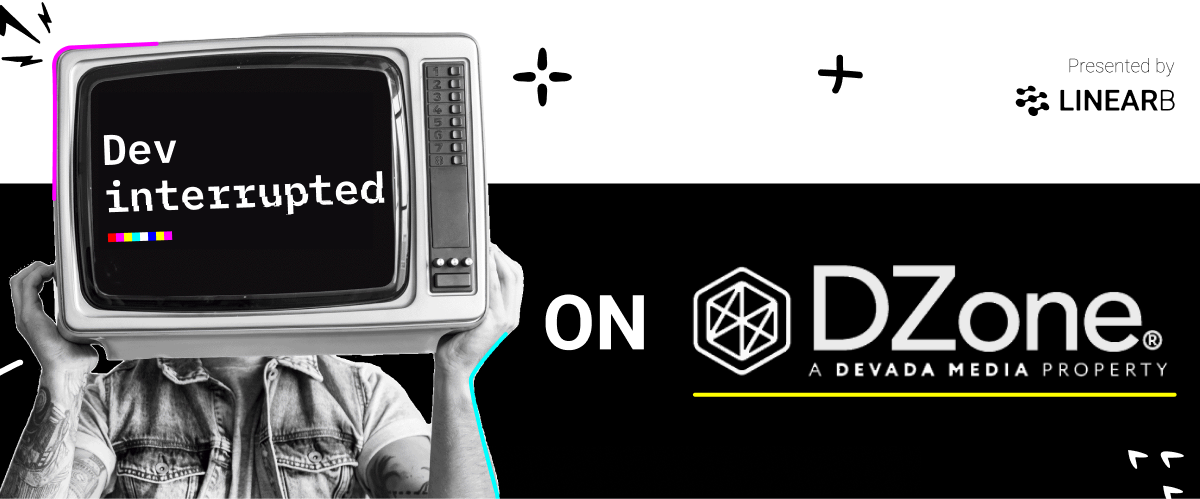What a Healthy Relationship With Open Source Looks Like Ft. Gitlab’s John Coghlan
Almost everyone uses open source, but how do they contribute to it? John joins Dan Lines on this episode of Dev Interrupted to talk about making devs' lives better
Join the DZone community and get the full member experience.
Join For Free There’s an open secret about open source: Developers use it. Teams use it. Businesses use it. But no one really thinks about how they contribute to it.
There’s an open secret about open source: Developers use it. Teams use it. Businesses use it. But no one really thinks about how they contribute to it.
That’s why we jumped at the chance to get a state-of-open-source discussion with Gitlab’s John Coghlan, Senior Manager of Developer Advocacy.
Someone who joined the open source community with the goal of making developers’ lives better, John came to the table with a wealth of insights into just how individual engineers leverage open source, how businesses leverage it and, most importantly, how to make our relationship with open source better - not just for you and me, but for the community as a whole.
We hope you find this candid conversation on how to be thinking about using open source in the right ways as empowering and insightful as we did!
Episode Highlights Include:
- (1:18) From Wall Street to GitLab
- (5:02) Dev Relations? Dev Advocacy? What are we?
- (7:57) John's start in open source
- (14:00) How to start contributing to open source
- (23:44) Open source contribution makes teams happier
- (28:12) How open source has benefited GitLab
Episode Excerpts:
How to get started contributing to open source projects:
Dan: If I'm a developer and I'm considering contributing to open source, like how do I get involved? Or like what should I be doing? How do I get in with either a maintainer or get my stuff approved? Like, what's the process for me?
John: Yeah. So I think, you know, there's a number of steps and paths that people can take to get started. And so that could be just going to a meet-up for that project and getting to know the community or kind of reading through their issue list or reading through the forum and getting an understanding around how that community communicates with each other. Whether you feel like that culture is something that you want to be a part of, like all those things I think are a great first step to fill people out. Other people, you know, who are maybe more experienced in contributing to open source will just jump into the issue list for a project that they've been using and find the thing that's been bugging them and go fix that. And so I think it really depends on like what your level of experience is, but I think for first-time contributors to open source, I think looking at some of the bigger projects like GitLab or Kubernetes or Chromium or some of the other ones trying to get a sense for how that community communicates, what are their pain points, what are the areas for contribution? Because it doesn't even need to start as a code contribution. It could be, you know, organizing a meetup. It could be giving feedback on a survey, it could be commenting on an issue. All of these things opening an issue, all of these things are like important contributions that contribute to the health of the project are great ways to, you know, kind of start getting involved in a community. And then as you get that sense of how that community works together and you to decide that you want to invest in time, then you can spend your time understanding the project and the code and then, you know, ultimately contributing some code to the project.
Is proprietary software more secure than open source?:
Dan: Are there any myths that you want to dispel about open source or contribution or using it?
John: Anything that you'd want our audience to know the truth about. There are a few myths. I think there's this thought that, like, open source is maybe less secure than proprietary software, or it's lower quality or it's not enterprise-grade. I think those types of things are probably like the big myths that need to be dispelled. I think, you know, if you look at the data behind open source versus closed source, I think what you'll find is that you know, things are very much on par with each other and there are risks to kind of both sides. And so, you know, I think that would be the one kind of myth that I think needs to be dispelled.
You're Invited to Interact on October 25th
Over $100 billion in engineering wisdom will be at your fingertips at Interact on October 25th.
Join engineering leaders from Shopify, Stripe, Slack and more at Interact, a free, virtual, community-driven engineering leadership conference.
Published at DZone with permission of Dan Lines, DZone MVB. See the original article here.
Opinions expressed by DZone contributors are their own.

Comments